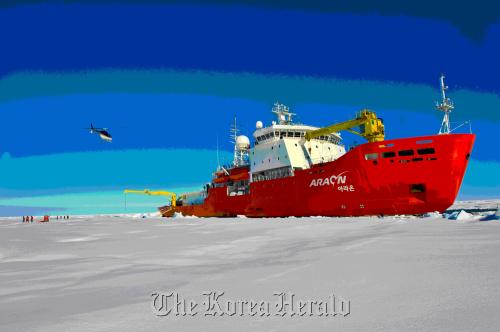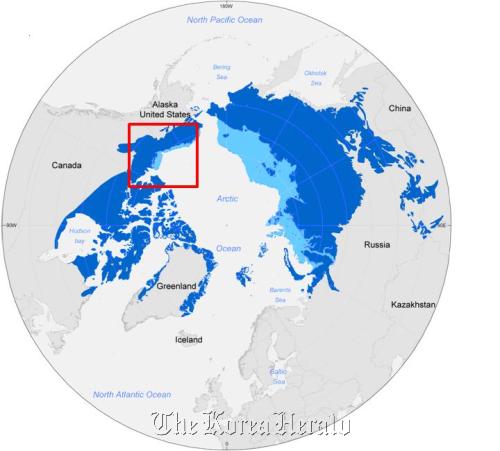Energy-hungry emerging economy eyes resources reserves, shipping lanes, permanent status at Arctic Council
Korea is stepping up its foray into the Arctic as melting ice caps are opening up a treasure trove of untapped resources, new sea routes and potential for scientific discovery.
Despite its late entry and lack of major energy corporations, Korea can harness its edge in shipbuilding and engineering in one of the world’s last uncharted frontiers, experts say.
Korea is hoping to boost its presence in the far north by becoming a permanent observer to the Arctic Council, an intergovernmental forum designed to address Arctic issues. Norway and Finland have already rallied behind Korea, according to government and diplomatic sources.
“There are two issues at stake ― natural resources and shipping routes,” said Kim Youn-gyoo, an energy and geopolitics expert at Hanyang University in Seoul.
“You can simply see it as a subject of geopolitical conflict but in fact it’s all intertwined with military, energy governance and other things. Who ends up controlling how much will completely change the game.”
 |
Korean icebreaker Araon is docked at a sea ice station in the Arctic. (Ministry of Land, Transport and Maritime Affairs) |
Competition is heating up among traditional Arctic powers and mineral-hungry economies vying to gain an upper hand in the mineral-rich region, of which sovereignty has yet to be fully established.
As the upcoming shipping lanes raise the possibility of territorial disputes, the U.S., Russia, Canada and Norway are beefing up their maritime forces and conducting naval drills.
Meanwhile, Korea, China, Japan and other European countries have dispatched researchers and icebreakers, while forging partnerships with Arctic nations.
Korea has been expanding its research there since it set up a research base on a Norwegian island in 2002, called the Arctic Dasan Station. In 2004, it launched the Korea Polar Research Institute in Incheon by spinning off a research unit from the Korea Ocean Research and Development Institute. Since 2010, it has been operating an icebreaker, named Araon.
On the business front, the country is raising its bet on future sea routes to ensure stable energy supplies and liven up its shipbuilding, logistics and trading industries.
The U.N.’s Intergovernmental Panel on Climate Change forecasts that the Arctic’s sea ice will melt away entirely by 2030. Other surveys based on the thickness of ice sheets claim its first ice-free summer could come as early as 2015.
“When the shipping lanes open, Korean shipyards and will see a spike in demand for ice-class ships, icebreakers, offshore plants and other special purpose vessels,” said Lee Sung-woo, director of international logistics at the Korea Maritime Institute in Seoul.
In addition, new commercial trans-Arctic routes will shorten the distance between Europe and Northeast Asia by up to a third. That may result in a sharp cut in demand for Middle Eastern crude from Korea and its neighbors as Russia ramps up its oil and gas output, said Kim Hak-ki, a researcher at state-run Korea Institute for Industrial Economics & Trade in Seoul.
The Arctic is estimated to hold about 30 percent and 13 percent of the world’s untapped natural gas and oil reserves, respectively, according to the U.S. Geological Survey.
Korea is the world’s No. 5 crude buyer and the No. 2 importer of liquefied natural gas. It imports almost all of its oil needs.
“Though unit costs have not been fully analyzed, Korea will likely have to take sea lanes along the Russian coast not just for container ships but for mining-related use especially if it wants to participate in resources projects in Russia,” he said.
 |
(The Korea Herald) |
However, Korea’s presence has been fragile chiefly because of its lack of resources powerhouses and late entry to the race compared with other Asian peers, experts say.
China and Japan, which are also aiming for permanent observers at the Arctic Council, have long been engaged in research there and courting other member countries as strategic partners.
ExxonMobil, BP, Rosnelt and other oil giants clinched deals to dip into the region’s vast crude and gas reserves.
Last year, state-run Korea Gas Corp. acquired a 20 percent stake in a natural gas field from Canada-based MGM Energy. That was the first and only mining deal in the region for a Korean firm.
“The mainstay of resources diplomacy is shifting to aggressive exploration from energy security,” Kim at Hanyang said.
“Korea needs to reform its economy, resources developers and the whole system according to the new order, while making state-run oil and gas firms more competitive.”
To catch up with bigger rivals, Korea is striving to bolster cooperation with state agencies, think tanks and businesses in the Arctic countries.
The government said Tuesday that it plans to conduct environmental and energy research with the U.S. and Canada in the Beaufort Sea within the Canadian exclusive economic zone. They will be accompanied by Araon, the icebreaker built by Hanjin Heavy Industries.
In February, officials from public agencies, shipping lines, steelmakers and research institutes met with their counterparts from Russia and Norway at a forum in Russia to discuss issues like cargo transport and the use of icebreakers.
The Ministry of Land, Transport and Maritime Affairs and state-run Korea Institute of Maritime and Fisheries Technology clinched agreements with two Russian institutes ― Admiral Makarov State Maritime Academy and CNIIMF ― to develop sailors and pilot voyages in the Arctic.
Korea is also working with Norway, Finland and Denmark, focusing on the shipbuilding, engineering and marine sectors.
Last week, Shin Maeng-ho, director general of international legal affairs at the Foreign Ministry, met with Karsten Klepsvik, Oslo’s ambassador to the Arctic Council, to discuss Korea’s membership, joint research projects and related policies.
Korea is among the 40 countries and international organizations wanting an observer spot at the eight-member council, also including Sweden and Iceland.
In 2008, Korea became an “ad hoc” observer along with China, the European Union, Italy and Japan. Their applications for permanent status were previously declined. The council will decide on their applications at its ministerial meeting in Canada, the next chair, in May 2013.
The current permanent observer states are France, Germany, the Netherlands, Poland, Spain and the United Kingdom. They are allowed to attend all meetings but do not have any voting rights or take the floor without permission of the chair.
There is little difference between the ad hoc and permanent status, Shin said, but the government is “trying to get a more secure position so it can watch how the meetings go, and discuss cooperation with stakeholders afterward.”
By Shin Hyon-hee (
heeshin@heraldcorp.com)
Kirsty Taylor contributed to this report. ― Ed.






![[Exclusive] Hyundai Mobis eyes closer ties with BYD](http://res.heraldm.com/phpwas/restmb_idxmake.php?idx=644&simg=/content/image/2024/11/25/20241125050044_0.jpg)
![[Herald Review] 'Gangnam B-Side' combines social realism with masterful suspense, performance](http://res.heraldm.com/phpwas/restmb_idxmake.php?idx=644&simg=/content/image/2024/11/25/20241125050072_0.jpg)

